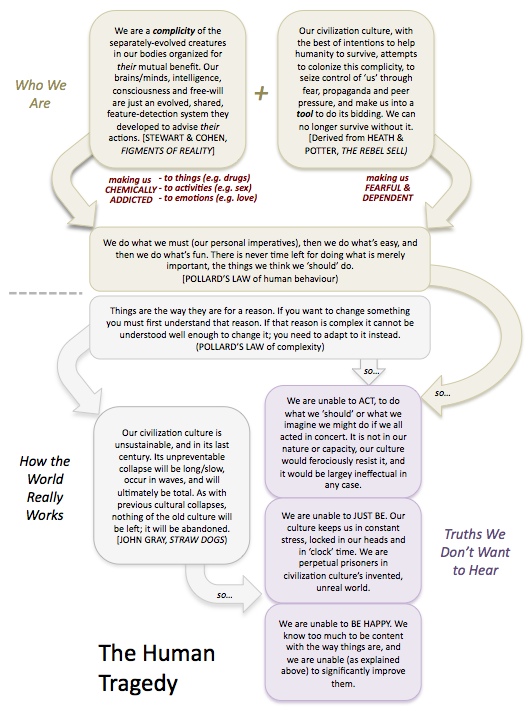The word ‘tragedy’ has a wonderful etymology. It literally means ‘song of the satyrs’ (the first ‘tragedies’ were ‘satyres’ of the human condition in which the players dressed in goatskins). Although it has come to mean a play with an unfortunate ending, it began as a story of the human condition, using satyrs (raw ‘uncivilized’ creatures), as a safe way to reflect upon (satyr-ize) our own species.
A way to bring out truths about us, and our society, that we might not want to hear if we thought they were really about us.
This blog has in recent years been trying to discuss such truths, without the art and subtlety of a true tragedy, with two major story arcs — who we really are, and how the world around us really works. Our story has all the elements of a brilliant tragedy — we could not ask for a better, more devilish script:
- Our satyric protagonists, Mr and Ms Sapiens, are torn between instinctive loyalty to their bodies, and learned/imposed obedience to their culture. Their bodies — their visceral selves — are telling them to live a wild, easy, fun life for the moment, in the moment. Their internal chemistries have addicted them to love, to sex, and to a variety of intoxicating substances and activities.
- But their new satyr culture frowns on such frivolity, and inundates them and their peers with propaganda calling for them to work hard, to conform to rigorous and repressive rules of conduct (including strict romantic and sexual monogamy), to obey without question those in authority, and to fight and even give their lives in defense of their culture and its fierce ideologies.
- The tension between these two opposing forces is paralyzing, debilitating, and the Sapiens have become ill, physically and psychologically, trying to reconcile them.
- So as the viewer of this play, on the one hand you sympathize with the Sapiens’ desire to be free, unencumbered by their culture, but on the other hand you also appreciate that without that culture and its inventions the Sapiens’ satyr species would be long extinct. The Sapiens are so immersed in and dependent on that culture they cannot escape it. They know no other way to live.
- So we watch as they vacillate between trying to go back and trying to go forward, and as the culture steals their souls and covers them with its gunk, its imprint, to the point they forget who they are and become “everybody else”, automatons in toil and violence and desperation. Until they are “steeped in blood so far that returning were as tedious as going o’er”.
- Soon, the Sapiens’ lives become a relentless cycle of doing what they must, until they are so exhausted that whatever brief and precious time they have left is spent not in finding a way out of the hellish life they have created/fallen into, but in activities that are easy and fun, that provide a few stolen moments of peace and joy.
- Their culture and their world have become so complex as to be no longer fathomable. They long for simple answers, and many proffer them, but they know too much to find any solace in any of these false promises and explanations, these “witches’ prophecies”. And they see this culture, inexorably and relentlessly destroying the world, out of control, and are filled with grief and a sense of terrible dread, anger, sorrow and shame for what it has done, and a sense of helplessness and hopelessness knowing in their hearts it will all soon end, badly.
- As the play reaches its climax, our protagonists find themselves unable to act, unable to simply be, and unable to be happy. What will they do? How will this dark tragedy resolve itself? Suicide? Violent struggle? Magical salvation?
A great story indeed. Fortunately it is only a satyre, an acting out of how another culture, such as the Easter Islanders or the Anasazi, or the fauns and satyrs of the primeval forest, might have faced existential crisis.
It could never be our story.






Fortunately, this is not us, for our own instinctive motivations are to live a wild, fun, and challenging life for a better future. :-) This is why we’re so upset and annoyed by the repression of the overly simplistic (non-complex) authoritarian rules, and it’s why so many people all over the planet are breaking free from the easy life of the subservience to the dinosaur that is for-profit~government and finding ways to be true to themselves finally, honoring their genes/bodies more fully and joyfully.
We are truly in a death spiral aren’t we?